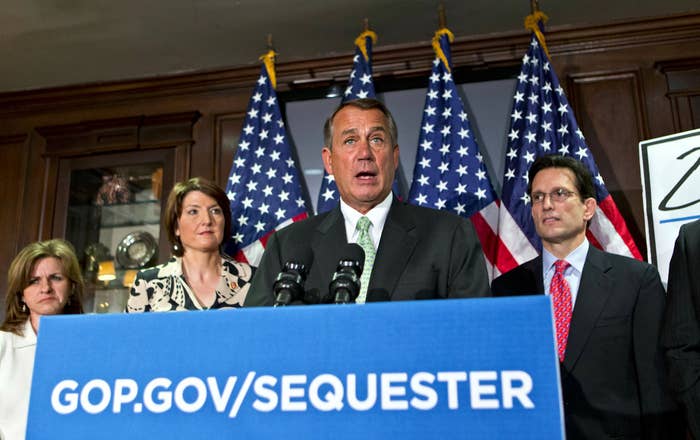
While lawmakers in Washington trade shots over the $1.2 trillion in automatic spending cuts, due to take effect Friday, there's a growing consensus among liberals across the country that the real threat to the social safety net isn't this fight, but the next one.
As originally designed in 2011, the deficit-reduction sequester splits cuts between defense and domestic spending, and explicitly exempted programs like Social Security and Medicaid. But no one in Washington believes the sequester cuts will be permanent, and liberals worry the deal Congress eventually reaches to replace it will slash funding to those programs — as Republicans and some Democrats have advocated.
"There's a broader concern about the fact that entitlements may get ensnared when we go to an alternative fix, [that] they won't escape," Rep. Jerry Nadler, a progressive Democrat from New York, told BuzzFeed. "I have heard that concern."
"Not only do we have the sequester, but we have to be thinking about the deal that replaces it as well," said Melissa Boteach, a director at the Center for American Progress. "Republicans have already begin to push hard for benefit cuts."
Although House Democrats signed a letter this month stating their opposition to entitlement cuts, President Barack Obama has signaled a willingness to bring such spending reductions to the table as part of a grand bargain with Republicans.
During the fiscal cliff talks last year, the president said he would consider implementing "chained CPI," a Social Security reform that would increase benefits more slowly over time. Whether Democrats will cede on such cuts to entitlements, without Republicans doing so with new revenues, is of increasing concern to the progressive community.
"The president has made one of his bottom lines that significant revenues have to be on the table," said Chuck Loveless, the director of legislation for AFSCME, a major public services employees union. "If he sticks to his guns on that, I'm not worried, but chained CPI is on his short list. We oppose that, and it is a significant cut to Social Security."
"These cuts are clearly on the Republican agenda," he added, pointing to a proposal from House Republicans to raise the Medicare eligibility age, which Obama rejected.
Democratic Rep. Henry Waxman said that his Republican colleagues in Congress have long been "gunning for the entitlements."
"So I worry about it," Waxman said. "But I also worry about the economy, because it seems to me, they don't worry about dragging down the economy while they're trying to gain leverage to hurt those entitlements."
The AFL-CIO, the country's largest federation of unions, released a statement this week urging Congress to repeal, not replace, the sequester, arguing that cuts to social security, Medicaid, and Medicare benefits were a form of "Republican ransom demands."
"There's no need to replace the sequester in full or in part. We don't need it," said Kelly Ross, deputy policy director of AFL-CIO. "Republicans are saying we need to address the source of the problem as leverage to get entitlement cuts."
"The worry is that Republicans have been very clear what they want from this — and that's entitlement reform," said Ross. "That's what they hope to get out of it, while they're saying no to taxes. Both sides are crying uncle."
As the deadline for the sequester comes and goes Friday with no budget deal in place — the Senate blocked two deals Thursday, and the House has already adjourned until Monday — entitlement cuts will be a major chip on the bargaining table as Congress struggles to reach a deal in future weeks.
As Nadler put it, "If you go in and decide to fix sequestration, how much longer can you exempt entitlements? It's difficult to do if you want to get bipartisan agreement."

